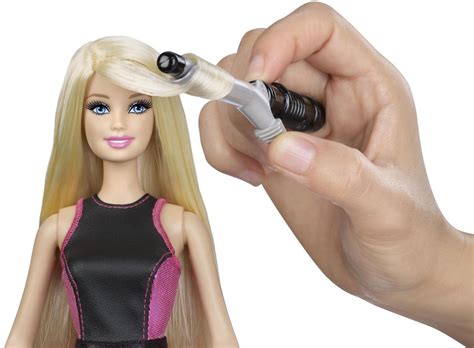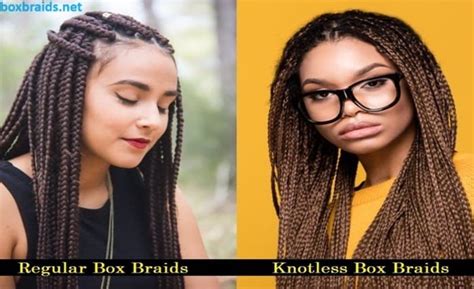Introduction

Protective styling is a crucial aspect of maintaining healthy natural hair. It involves using techniques that minimize breakage, reduce tangles, and protect the hair strands from environmental damage. Among the most popular protective hairstyles are box braids and knotless braids. Both offer unique advantages and drawbacks, making it essential to understand their differences to make an informed choice.
Box Braids
Box braids are a classic protective style characterized by square-shaped sections that are braided tightly against the scalp. They are typically made with synthetic hair extensions, which provide length, volume, and versatility.
Advantages:
- Long-lasting: Box braids can last up to 8 weeks or longer with proper care.
- Versatile: Box braids can be styled in endless ways, such as buns, ponytails, and updos.
- Protective: The tight braiding technique effectively protects the hair from breakage and tangles.
- Low maintenance: Box braids require minimal daily upkeep, making them a convenient option for busy individuals.
Disadvantages:
- Installation: Box braids can take several hours to install, depending on the length and thickness of the hair.
- Painful: The tight braiding can cause some discomfort or pain, especially for individuals with sensitive scalps.
- Heat damage: The synthetic hair used in box braids can be susceptible to heat damage, so it’s essential to avoid excessive heat styling.
Knotless Braids
Knotless braids are a newer protective style that resembles box braids but without the tight braiding at the root. Instead, the hair is fed into the braid without creating a knot, resulting in a more natural and less bulky appearance.
Advantages:
- Less painful: Knotless braids eliminate the discomfort associated with the tight braiding of box braids.
- Natural-looking: The absence of knots gives knotless braids a more seamless and natural appearance.
- Scalp health: The loose braiding allows air to circulate around the scalp, promoting scalp health and reducing the risk of irritation.
- Time-saving: Knotless braids typically take less time to install than box braids, making them a more efficient option.
Disadvantages:
- Less durable: Knotless braids tend to last shorter than box braids, typically around 6-8 weeks.
- Less versatile: The loose braiding limits the styling options for knotless braids compared to box braids.
- More maintenance: Knotless braids require more regular touch-ups to maintain their neatness and prevent frizz.
Choosing Between Box Braids and Knotless Braids
The best choice between box braids and knotless braids depends on individual preferences, hair type, and lifestyle.
- Choose box braids: If you desire a long-lasting, versatile, and low-maintenance protective style that can withstand daily wear and tear.
- Choose knotless braids: If you prioritize comfort, a natural appearance, and scalp health, and are willing to trade off some durability and versatility.
Comparative Tables
| Feature | Box Braids | Knotless Braids |
|---|---|---|
| Installation time | Longer | Shorter |
| Pain level | Higher | Lower |
| Durability | Up to 8 weeks | 6-8 weeks |
| Styling versatility | High | Moderate |
| Feature | Box Braids | Knotless Braids |
|---|---|---|
| Hair extensions | Synthetic | Natural or synthetic |
| Braiding technique | Tight braiding with knots | Loose braiding without knots |
| Appearance | Square-shaped, bulky | Natural-looking, seamless |
| Feature | Box Braids | Knotless Braids |
|---|---|---|
| Scalp health | Less airflow, potential irritation | More airflow, better scalp health |
| Hair damage | Susceptible to heat damage | Less susceptible to hair damage |
| Maintenance | Minimal daily upkeep | Regular touch-ups required |
FAQs
- Which style is less painful? Knotless braids are less painful due to their loose braiding technique.
- Which style lasts longer? Box braids typically last longer than knotless braids.
- Which style is more versatile? Box braids offer more styling options than knotless braids.
- Which style is better for sensitive scalps? Knotless braids are recommended for individuals with sensitive scalps.
Conclusion
Both box braids and knotless braids provide effective protection for natural hair. The choice between the two ultimately comes down to the individual’s priorities and preferences. By carefully considering the advantages and disadvantages of each style, individuals can select the protective hairstyle that best suits their needs and desires.
